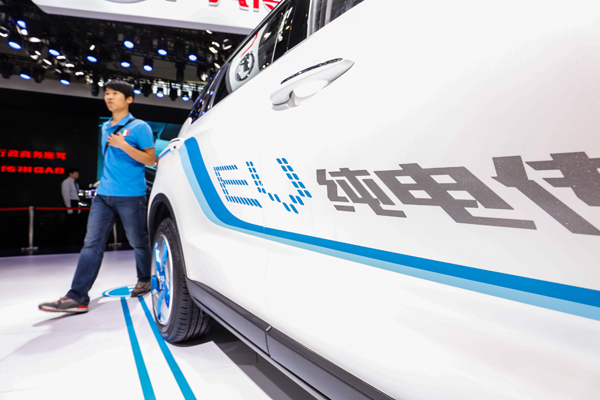 |
|
A new energy car at the Beijing auto show in April. Some Chinese electric carmakers aremulling over trade-in plans for new energy vehicles. Zhang Haiyan / For China Daily |
Industry leaders are set to fine-tune the mechanics of the NEV sales sector to meet customer expectations
Chinese electric carmakers are introducing trade-in plans for new energy vehicles, a move industry insiders believe will help stimulate the booming sector in the world's largest auto market.
Zhao Changjiang, head of BYD's Beijing and Tianjin sales division, told China Daily that the company is working on a trade-in plan, which will be unveiled as early as 2017.
"The plan will be drafted in accordance with national regulations to meet the customer demand (for trading in their used cars)," he said, declining to offer more details.
BYD is one of the most popular new energy car brands in China, accounting for 30 percent of the market in the first quarter of 2016.
Beijing Business Today reported that BJEV, the new energy vehicle arm of BAIC Group, has similar plans.
"We have been conducting related studies in the field of used new energy cars for several years, and our plan will be made public by the end of the year," said Zhang Yong, general manager of BJEV's sales company.
China has become the world's largest market for new energy vehicles, with 207,000 units, including pure electric ones and plug-in hybrids, sold in the first seven months of the year, according to the China Association of Automobile Manufacturers.
Despite the sales of new cars, the country lacks a system for evaluating and trading in used cars.
Experts agree that the situation is the result of several causes: there are few new energy vehicles in the market - they accounted for about 1 percent of China's total car sales at the end of 2015 - and their evaluation demands more professional expertise than gas-powered cars.
But they believe that the carmakers' move will be an industry model and help speed up the development of a system of evaluation and trade in the used car market. Their trade-in plans will also stimulate new car sales.
Ma Lianhua, a new energy car dealer in Beijing's Tongzhou district, said one of the conerns of potential customers is how to deal with the battery when its warranty expires.
According to a notice four ministries released in early May 2015, carmakers are required to offer an eight-year or 120,000-kilometer warranty for new energy car batteries and electric motor systems.
"If they put in place such a plan, they leave customers with no worries, and surely it will boost our sales," said Ma, an auto reporter-turned car dealer, who is selling about 30 new energy vehicles a month.
Meanwhile, experts warn that national standards for the recycling and disposing of batteries should be established as soon as possible.
According to the China Automotive Technology and Research Center, there will be 120,000 to 170,000 metric tons of used batteries in the country by 2020 based on China's plan to have 5 million electric cars on the roads by then.
